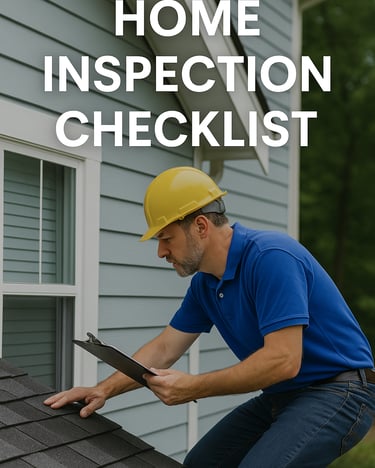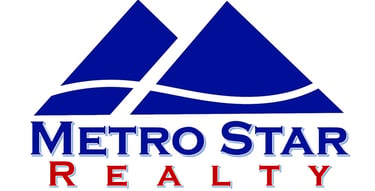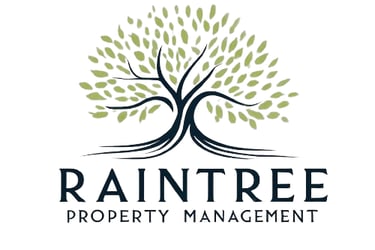The Ultimate Home Inspection Checklist Every Buyer Needs
Discover the ultimate home inspection checklist. Learn what to check before buying a home to avoid hidden costs and protect your investment. Buying in Metro Atlanta or southeast Michigan? Use this home inspection guide to spot red flags, prevent costly repairs, and make smarter real estate decisions. From roof to radon, here’s your complete home inspection checklist. Protect your investment and buy with confidence.
REAL ESTATE ABCSREAL ESTATE INVESTING
9/6/20254 min read


Introduction
Whether you're eyeing a charming colonial in Southeast Michigan’s suburbs like Ann Arbor or a sleek townhome in Metro Atlanta’s bustling neighborhoods like Buckhead, buying a house is both exciting and overwhelming. It’s one of the biggest investments you’ll ever make—but hidden issues can quickly sour the deal if you’re not prepared.
Both Michigan and Georgia require sellers to disclose known defects, though the rules differ. Michigan mandates a detailed Seller’s Disclosure Statement, while Georgia sellers typically use the Georgia Association of Realtors’ Seller’s Property Disclosure Statement. The catch? These disclosures only cover what the seller knows. That’s why partnering with a trusted agent and using a thorough inspection checklist is your best defense.
This guide—tailored to Southeast Michigan’s snowy winters and Metro Atlanta’s humid summers—highlights what to check before you buy, so you can avoid costly surprises.
Structural Conditions: The Foundation of Your Future Home
Start with the essentials—your home’s backbone. A professional inspector should review:
Roof: Look for leaks, missing shingles, or storm damage. Michigan’s snow and ice dams, plus Georgia’s hurricanes, take a toll.
Foundation: Watch for cracks or settling. Freeze-thaw cycles affect Michigan, while Georgia’s clay soil often expands and shifts.
Walls & Ceilings: Water stains, cracks, or bulging may signal hidden problems.
Fireplace & Chimney: Check venting and blockages.
Floors: Test for squeaks or uneven areas.
Windows & Doors: Proper seals matter—energy efficiency is critical in Michigan’s cold and Georgia’s heat.
Garage, Patio & Deck: Inspect for structural stability or rot, especially with Georgia’s rainfall.
💡 Pro tip: In Michigan winters, AC systems often can’t be tested—negotiate a seller-paid home warranty. In Georgia, consider add-ons for pools, which face humidity-related wear.
Usage Conditions: Making Sure Everything Runs Smoothly
Functionality keeps a house livable. Your inspector should evaluate:
Plumbing: Leaks, water pressure, and drainage. Michigan’s hard water and Georgia’s older pipes deserve close attention.
Electrical System: Outdated wiring can be a safety hazard.
Heating & Cooling: Vital in both Michigan winters and Atlanta summers.
Sewer or Septic: Backups are expensive to fix.
Appliances & Fixtures: Confirm proper operation.
Basement Systems: Sump pumps are common in Michigan—don’t overlook them.
Skipping this step can lead to thousands in repairs later.
Environmental Hazards: Protecting Your Health
Different climates, similar risks:
Asbestos: Found in pre-1980s homes; hire professionals if renovating.
Lead-Based Paint: A serious risk in homes built before 1978. Testing runs $50–$450, with remediation negotiable.
Mold: Michigan’s damp basements and Atlanta’s humidity create prime conditions. Musty odors are a red flag.
Radon: Both states have risks. Testing costs $100–$130; mitigation averages $800–$1,500. Always add this as a contract contingency.
Your health is worth the extra diligence.
Other Conditions: Pests, Floods & Neighborhood Quirks
Termites: Rare in cold Michigan but rampant in Georgia. Most Georgia lenders require a Wood Infestation Inspection Report (WIIR).
Flood Risk: Michigan homes near lakes or rivers may flood. In Atlanta, FEMA maps reveal flood-prone pockets.
Permits & Easements: Verify that renovations were permitted and easements are documented.
Shared Access: Driveways, walls, or private roads can mean extra responsibilities.
Crime & Stigmas: Research local crime stats or unusual property histories.
Municipal Inspections: Local Requirements
Some cities in both Michigan and Georgia require municipal inspections before closing. These cover permits, zoning, setbacks, parking, and safety items like smoke detectors. The seller usually pays, and inspections take 30 minutes to 2 hours.
⚠️ Important: City inspections don’t replace professional inspections, which dig deeper into roofs, plumbing, and structure. Always verify requirements with city hall.
External Property Conditions: What’s Nearby?
Proximity matters:
Highways & Railroads: Noise and vibrations.
Industrial Sites: Air quality issues.
Military Bases: Noise disruptions.
Superfund or Toxic Sites: Environmental hazards.
Future development plans can also affect value—always research.
Legal & Financial Red Flags
Protect yourself from hidden obligations:
Short Sales & Foreclosures: Expect delays; Georgia uses non-judicial foreclosure processes.
Code or Zoning Violations: Could mean unexpected fixes.
HOA Obligations: Georgia HOAs can foreclose for unpaid dues.
Liens or Judgments: Ensure title is clear before closing.
Planned Assessments: Check for future costs like road improvements.
The Neighborhood Factor
A house isn’t just the structure—it’s the community. Look into:
Noise: Dogs, traffic, or nightlife.
Traffic & Commute: A daily frustration in Atlanta; also a concern in Michigan suburbs.
Safety & Crime Stats: Local police data can help.
Parking: Particularly important in dense Atlanta neighborhoods.
Sellers aren’t required to disclose commute times, feng shui, or “haunted” histories—so talk to neighbors if these matter to you.
Preventive Measures: Safeguard Your Investment
Finally, use every tool available:
Professional Home Inspection: Always essential.
Home Warranty: Covers repairs post-closing.
C.L.U.E. Report: Reveals 5 years of insurance claims.
Home Insurance: Secure coverage before closing. Consider flood, sewer backup, or earthquake coverage as needed.
Conclusion
Buying a home—whether in snowy Southeast Michigan or humid Metro Atlanta—is a major investment. A comprehensive inspection checklist is your best defense against hidden problems and unexpected costs. With the right guidance, you can move forward with confidence.
Thinking about buying a home in Metro Atlanta or SE Michigan? Contact me today for a free consultation—I’ll help you navigate the process and find the right home with confidence.
Disclaimer: The content on this blog is for informational and educational purposes only and does not constitute professional real estate, financial, or legal advice. All investments involve risk, including the possible loss of capital. Past performance of any market or investment is not a guarantee of future results. The real estate market changes constantly, and while we strive for accuracy, we make no guarantees about the completeness or reliability of the information presented. You should always consult with a qualified professional before making any investment or financial decision.
MICHIGAN OFFICE
office.metrostar@gmail.com
248-716-5899




GEORGIA OFFICE
raintreepm@hotmail.com
470-236-9199
